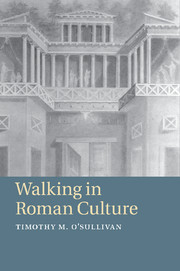Book contents
- Frontmatter
- Contents
- Figures
- Acknowledgements
- Abbreviations
- Introduction
- Chapter 1 The art of walking
- Chapter 2 Seneca on the mind in motion
- Chapter 3 Urban walkers on display
- Chapter 4 Cicero’s legs
- Chapter 5 Theoretical travels
- Chapter 6 Walking with Odysseus
- Conclusion
- Bibliography
- Subject index
- Index locorum
Chapter 4 - Cicero’s legs
Published online by Cambridge University Press: 05 August 2011
- Frontmatter
- Contents
- Figures
- Acknowledgements
- Abbreviations
- Introduction
- Chapter 1 The art of walking
- Chapter 2 Seneca on the mind in motion
- Chapter 3 Urban walkers on display
- Chapter 4 Cicero’s legs
- Chapter 5 Theoretical travels
- Chapter 6 Walking with Odysseus
- Conclusion
- Bibliography
- Subject index
- Index locorum
Summary
Cicero’s De oratore imagines a conversation on eloquence among the leading Roman statesmen of the late second and early first century bce, including L. Licinius Crassus and Q. Lutatius Catulus. As is typical in his early philosophical and rhetorical works, Cicero goes to great lengths to defend his choice of subject matter, and he transfers his anxieties to his characters, who frequently reflect in a rather self-conscious manner upon the form of the dialogue itself. On the morning of the second day of their discussion, for example, Crassus voices his concern that, with their Socratic style of question-and-response, they might pick up some of the bad habits of the Greeks, who are only too willing to debate any point, any time, anywhere, ad nauseam (Cic. De or. 2.18). At this point Catulus interjects, disputing the notion that all Greeks behave in this manner: the best Greeks – by which he means politically active Greeks – confined their philosophical disputation to their free time, their otium. To strengthen his case, and to allay Crassus’ anxieties, he appeals to their surroundings; he draws particular attention to the portico of Crassus’ Tusculan villa, in which they are walking, as an especially appropriate setting for philosophical conversation (De or. 2.20):
ac si tibi videntur qui temporis, qui loci, qui hominum rationem non habent, inepti, sicut debent videri, num tandem aut locus hic non idoneus videtur, in quo porticus haec ipsa, ubi nunc ambulamus, et palaestra et tot locis sessiones gymnasiorum et Graecorum disputationum memoriam quodam modo commovent? aut num importunum tempus in tanto otio, quod et raro datur et nunc peroptato nobis datum est? aut homines ab hoc genere disputationis alieni, qui omnes ei sumus, ut sine his studiis vitam nullam esse ducamus?
- Type
- Chapter
- Information
- Walking in Roman Culture , pp. 77 - 96Publisher: Cambridge University PressPrint publication year: 2011



